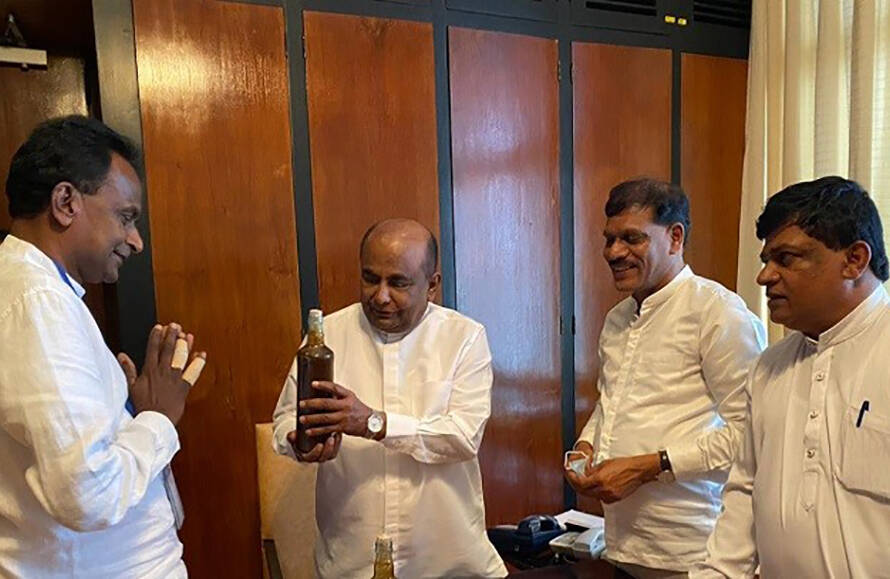By Chiranjeewa Desaduni
The National Research Council (NRC) of Sri Lanka offers vital financial support to scientists operating in the public sector. As of 2023, the NRC’s annual budget stands at LKR 80 million.
In a notable stride in 2013, the NRC, with the Ministry of Technology and Research, initiated a program aimed at invigorating a collaborative approach. The program solicited pre-proposals from a number of public scientific research and development entities, universities, and research groups.
The catalyst behind this was the Target-Oriented Multi-Disciplinary Research Grants. Economic development, social welfare, and environmental sustainability constitute the focus of these grants, addressing issues of profound significance.
Central to this initiative was the establishment of a Research Grants program. The program stands as a platform offering competitive grants to public institutions for the purpose of fostering research and development.
Over time, the program has undergone refinement, emphasizing scientific excellence, alignment with national development objectives, and the dissemination of findings through international journal publications.
The Public R & D Private Industry Partnership (PPP) initiative represents yet another noteworthy stride. At its core, this initiative seeks to cultivate collaboration across diverse sectors, ultimately magnifying the impact of research and development and substantively contributing to Sri Lanka’s economic advancement.
Against this backdrop, the National Research Council has played the role facilitating connections between government bodies, local institutions, universities, research and development establishments, corporate entities, small and medium enterprises (SMEs), and other stakeholders.
The overarching goal here is to address the research and development requirements of industries, thereby furnishing research-based solutions.
Integral to this vision is the cultivation of meaningful partnerships that facilitate the sharing of research acumen, facilities, and services, thereby streamlining both the temporal and financial aspects of research and development.
As of 2018, Sri Lanka counts a meager 105.61143 researchers per million inhabitants, in contrast to the United States, which records an impressive 4747.84172, and South Korea, which records 7980.39565 researchers per million inhabitants.
This imbalance is reflected in the Gross Expenditure on Research and Development (GERD) as a percentage of GDP. In 2018, Sri Lanka’s GERD stood at 0.11949%, while South Korea commanded a robust 4.51633%. In 2020, Sri Lanka’s GERD stood at 0.12%, whereas South Korea’s figure improved to 4.75971%.
No doubt noting these disturbing imbalances, the National Research Council of Sri Lanka allocated funds amounting to LKR 174.62 million in 2018 for research projects. Projects were allocated funding under four panels.
Panel 1: Medical Science / Food and Nutrition
Panel 2: Agriculture / Plantations / Livestock and Fisheries
Panel 3: Engineering Technology / Information Technology / Physical Sciences and Electronics
Panel 4: Ecology and Environment / Geoscience / Chemical Sciences and Others
The allocation aimed at fostering progress across crucial sectors. Yet as of 2013, Sri Lanka has allocated a mere 0.11% of its GDP for this. This figure stands in contrast to the global average of 2.23%. It underscores the significant gap between Sri Lanka’s current research investment and the global benchmark.
This disparity carries implications beyond numbers. A nation’s research endeavors are intrinsically tied to its economic growth, technological advancement, and global competitiveness. A higher percentage of GDP allocated to research signifies a deeper commitment to fostering innovation, spurring scientific exploration and positioning the nation as a participant in the global knowledge economy.
The contrasts in figures between Sri Lanka and countries like South Korea and the US is a serious concern. It is in fact a potential deterrent to Sri Lankan researchers venturing into the realm of research within the country. It is disheartening to note that despite boasting of a robust education system, Sri Lanka lags when it comes to the allocation of resources to future-oriented research initiatives.
Sri Lanka also boasts a commendable education framework that has yielded world-class researchers. This underscores a crucial reality: when armed with adequate funding and governmental backing, Sri Lankans can exhibit their talent across diverse fields, contributing substantively to the corpus of knowledge.
The allocation of limited resources can motivate researchers. The disparity in funding thus raises questions about the accessibility of necessary tools, technologies, and infrastructure. Researchers’ ability to pursue projects and pioneer groundbreaking discoveries could be hindered by financial constraints.
Nevertheless, there is a glimmer of hope. Sri Lankan researchers have accomplished much on the international stage, a testament to the nation’s latent potential. By channeling more substantial investments into research and development, Sri Lanka could unlock a wave of creativity and ingenuity.
The government’s commitment to an environment conducive to research could act as a catalyst here, inspiring researchers to delve into investigations that address not only national challenges but also contribute to global knowledge.
One concern that warrants consideration is Sri Lanka’s educational framework, which places an emphasis on theoretical learning, often overshadowing practical and innovative approaches to theoretical concepts.
This approach potentially impedes the development of a culture conducive to nurturing researchers from their formative years, subsequently throughout their academic and professional journeys.
The prevailing model in Sri Lanka tends to prioritize rote memorization and examination-based assessments. This approach, though designed to ensure academic proficiency, may discourage the cultivation of critical thinking and independent research skills.
The rigidity of such a system leaves students with limited time and opportunity to explore their ideas, engage in self-directed inquiries, and nurture a sense of curiosity that is at the core of becoming a researcher.
Schools across Sri Lanka are often constrained by an exam-centric structure, which restricts students’ ability to engage in individual research and innovation. This imbalance not only dampens the enthusiasm to explore but also impedes the development of problem-solving skills, creativity, and the capacity to analyze and interpret complex data. These skills are crucial for those who aspire to embark on a path of research and contribute meaningfully to various fields.
There is a correlation between an exam-oriented education system and a lower research density. Individual research demands an environment that encourages experimentation, exploration, the freedom to ask questions.
Indeed, the absence of practical application and independent inquiry can hinder the transformation of students into inquisitive, resourceful researchers.
It is imperative to rethink the educational paradigm. A shift towards an approach that blends theoretical understanding with practical application, critical analysis, and individual research could prove transformative. By fostering an atmosphere that celebrates curiosity, innovation, and problem-solving, schools can nurture a new generation of thinkers, tinkerers, and researchers.
In essence, altering the trajectory can pave the way for a holistic transformation of the educational ecosystem, one that harmonizes theoretical knowledge with hands-on experience, empowers students to think independently, and paves the way for a thriving culture of research and innovation. That has the potential to not only boost research density but also bolster Sri Lanka’s position globally.
In a world marked by constant innovation and scientific advancement, it is crucial that Sri Lanka seize the opportunity to nurture its research landscape. By increasing financial support and creating an ecosystem which nurtures intellectual exploration, Sri Lanka can harness its talents to drive progress on several domains.
The international success stories of Sri Lankan researchers indicate that with the right resources and government backing, the country can evolve into a formidable force within the global research arena.
Chiranjeewa Desaduni is an Undergraduate in the Department of Biological Science and Biotechnology at Hannam University, South Korea, who can be reached at gdchiranjeewa123@gmail.com.
Factum is an Asia-Pacific focused think tank on International Relations, Tech Cooperation and Strategic Communications accessible via www.factum.lk.
The views expressed here are the author’s own and do not necessarily reflect the organization’s.


